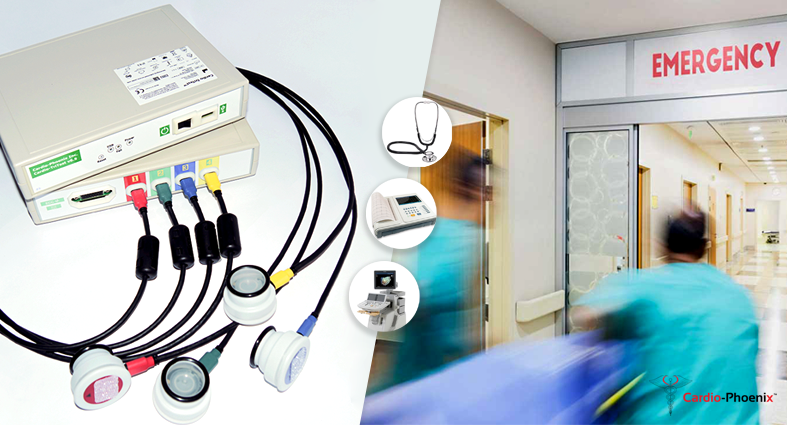
Cardio-Phoenix secures Angel funding for early heart disease-predicting AI
September 9, 2022
London, Lisbon, Toronto, September 2022.
Cardio-Phoenix’s AI assesses novel bio-signals of the heart to predict 14 significant cardiac abnormalities typically diagnosed only by Echocardiography in Secondary Care.
By evaluating the likelihood that those abnormalities are characteristic digital biomarkers of heart disease, the software is able to detect and diagnose a wide range of heart diseases, with a capability for the early detection of Cardiovascular Disease (CVD) onset, specific to each disease.
Cardio-Phoenix combines the diagnostic capabilities of an AI Reported ECG, an eStethoscope, and an Echocardiograph. Its findings cover ~93% of all common[1] heart diseases, and their severity, including heart failure (all three types, preserved [HFpEF], mild reduced [HFmrEF], and reduced [HFrEF]), and related structural (atrial and ventricular enlargement), functional (systolic and diastolic dysfunction) and valve abnormalities (stenosis or regurgitation).
The overall goal of the technology is to catch potentially fatal heart disease before symptoms become overt — especially since the first indicator of cardiovascular disease for many patients is either a visit to the emergency room or a heart attack. In the UK, nearly 80% of all heart failure diagnosis is discovered on hospital admission, despite the fact that nearly 70% of them had seen their GP in the prior 6 months, with symptoms and signs of heart failure.
“The status quo for heart health simply isn’t good enough—for patients, providers or payors—and our proven approach to examining for early signs of heart disease through novel digital bio-signals promises not only to deliver the change we need right now,” said Cardio-Phoenix CEO and founder, “...but also to provide easy accessibility for patients to get the examination they need, on initial presentation to Primary Care.”
The system is powered by large datasets of previously assessed Bio-Signals, as well as data collected in clinical trials spanning ten’s of thousands of patients collected over many years. Cardio-Phoenix is aiming to further expand that repository with its ongoing studies, which plan to enroll more than 1,000,000 patients from across the globe within the next few years.
Those research efforts have already proven the AI’s talent at singling out early signs of heart disease, doing it in Primary Care no less, even when compared to the current standard for diagnosis: the Echocardiogram, which requires a cardiologist to image the heart. Echocardiography is not used as a method for the detection of early onset of heart disease as it is not available in Primary Care and it is simply too expensive and time-consuming for cardiologists.
More recently, Cardio-HART’s AI has found great utility within hospital settings, providing valuable Echocardiography indication findings, where Echocardiography is not available, but highly desirable. For example, in Oncology, in Respiratory Care (COPD), in Pre-surgery, in Emergency, and even in Cardiology, where Echo-equivalent examinations can be regularly conducted to track disease progression, effects of medication, or simply as part of doing the daily rounds. “... It’s equivalent to doing an Echocardiograph examination on each patient, every day. This is something that is not feasible with Echo devices” said Dr. Sandor Khoor, chief cardiologist, Budapest, “...the CardioHART examinations are first done by a nurse, I simply review the reports during rounds”.
Unlike Echocardiography, Cardio-HART’s AI is quick, non-invasive and gives immediate results. It does not require specialist input in carrying out the investigation and does not require specialist reporting. This makes it ideal for use in any clinical care settings, including Primary Care.
“since its arrival in our surgery, Cardio-HART’s AI has proven transformative, we make fewer and better referral decisions” according to Dr. Nasir Hannan, GP, “...with wait-lists on the order of 6 months for Echocardiography, being able to essentially do an Echo now lets me know who is most at risk, basically it’s echo for primary care”.
In a study published earlier this year, Cardio-Phoenix’s CE-cleared AI algorithms were able to analyze the bio-signals with a strong correlation to the results of the Echocardiograph exams, the Cardio-HART’s AI findings are disease equivalent to Echo-findings. Altogether, the AI’s analysis demonstrated 80% sensitivity and 86% specificity, a PPV of 86%, an NPV of 99%, with an overall accuracy level of at least 84%, for 93% of all common cardiac abnormalities.
The Angel funding will help with production and wider deployment into clinical settings.
[1] Common diseases by prevalence. CHART does not detect very rare diseases with very low prevalence (<.01%).
Check the case study published on Open Heart: openheart.bmj.com/content/9/1/e001852
1 Common diseases by prevalence. CHART does not detect very rare diseases with very low prevalence (<.01%).
